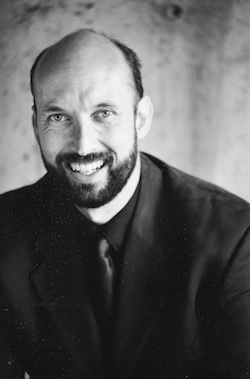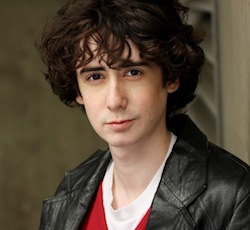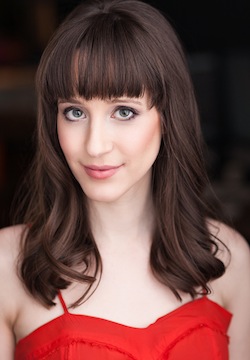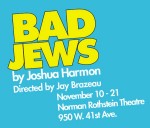Imagine finding a play so funny and thought-provoking that you just had to mount a production of it in your hometown – and you actually had the talent and wherewithal to do it.
Famous Artists Limited’s Bill Allman saw Joshua Harmon’s Bad Jews in London. He’s bringing it to Rothstein Theatre Nov. 10-21, directed by Jay Brazeau and starring two other members of the Jewish community, Amitai Marmorstein and Goldie Hoffman. Rounding out the cast are Alex Rose and Kayla Dunbar.

“It’s really difficult to pick one or two moments of hilarity or emotion from a play that kept me laughing and thinking for its entire duration,” said Allman, “but I loved the raucous interaction between [cousins] Liam and Daphna and, in particular, watching Melody (that’s Liam’s shiksa girlfriend) react to them. The loudness and the verbal vitriol looks completely insane to her and yet the three cousins are sort of saying, ‘What? This is how people talk!’
“As for deep thought, much of the script gives the audience a chance to think about where faith and culture intersect and how these values affect daily life and interaction with others. The great thing about the play is that the characters are drawn in such a way as to illustrate a wide range of human experience and it doesn’t matter where you fall on the spectrum – there will be something in one or more of the characters that makes you say, ‘I’m like that.’ And you may laugh or you may wince but, inevitably, you’ll laugh because 10 seconds later, it’s somebody else’s turn to wince!”
Secular Liam, his “Jew-ish” brother Jonah and their staunch Zionist and Orthodox cousin Daphna fight over the right to their grandfather’s chai necklace after he dies; he had managed to get it (and himself) through the Holocaust, and they each attribute a different importance and symbolism to it. Witnessing the mayhem, as Allman noted, is Liam’s non-Jewish girlfriend, Melody.
“Which one of them is the ‘best’ Jew?” reads the promotional material. “Is it the religious and cultural zealot Daphna, who changed her name from Diana? What about her privileged cousin Liam, who missed Poppy’s funeral to go skiing with his non-Jewish girlfriend Melody? Or perhaps Liam’s brother, Jonah, the quiet one who would prefer not to get involved in the fight?”

Marmorstein, who plays Jonah, was emailed by Brazeau with a request to read the script. “I’ve known Jay for awhile and have always been a very big fan of his,” Marmorstein told the Independent. “He arranged for Goldie and I to come in and read and talk about the play. He kept saying it wasn’t an audition even though it sort of was. I think he just didn’t want us to get nervous or anything. But the ‘non-audition’ went well, I guess, and Goldie and I were both offered roles.”
Director, writer, actor and producer Ben Ratner recommended Hoffman (who plays Daphna) to Brazeau. “Ben runs and teaches at Haven Studio, and I’ve trained with him a lot, working on many intense plays and scripts in multiple genres. So, it’s really thanks to Ben that I got this part,” she said, “both because of his recommendation and also thanks to his training.”
Hoffman was asked by Brazeau and Allman to read with Marmorstein, and she also recalled being told, “‘Don’t think of this as an audition, Goldie …’ they said and, as I jokingly thought to myself, the unsaid continuation of that line was, ‘… but this read will likely affect whether or not you get the part.’
Fortunately, I got the part, and I’m thrilled and truly honored to be playing such a fun role and being part of this ensemble.”
Characters that are a “type” can come off as superficial. When asked in what ways they infuse their characters with humanity and depth, Marmorstein said, “The best way to never be a stereotype is to work with great writing. Joshua Harmon has written such honest, original, devastating characters that our job becomes much, much easier. I think creating real, non-stereotypical characters is precisely what the art of acting is, so we just try to be creative and honest and hope people connect to it.”

Hoffman went into more detail. “I think it’s important not to judge your character as good or bad, right or wrong,” she said. “Humans are complex individuals and it’s important to remember that when you portray any character. In fact, generally in real life, we don’t set out to be wrong or behave badly. Most of us try to go through life making good choices, and when we make bad ones or hurt people, we often don’t intend to or don’t even realize the impact of our words and actions. When playing a character, I try to portray their point of view, as best as I can understand it. In fact, after first reading the play, I was actually offended when first seeing Daphna described as a ‘zealot’ in online play reviews and synopses, because I see that term as quite negative, and I didn’t see (or want to see) her that way.
“I feel I really understand where Daphna is coming from, even if I don’t share all her views. In fact, I’d go as far as to say, this is a character that is closest to me of all the roles I’ve ever portrayed – to the point where it’s scary and even embarrassing. As for playing a certain ‘type,’ it’s true there is a certain stereotype and similarity many Jewish girls and women share and, yes, a lot of it does apply to me: brunette, outspoken, loud, animated and, yes, also stubborn and annoying – but also spunky, fun, caring, intelligent and funny (and clearly modest). Hey, let’s face it, get a bunch of Jewish girls in the room, and I challenge you to tell me many don’t look and sound like sisters. Daphna shares these qualities, too, but, at the same time, we’re of course all individuals, and so our views and outlooks on life can be extremely different.
“As far as her being real,” Hoffman continued, “to me, Daphna already is a real person, and I can completely see and hear her, so I only hope I can translate that successfully to the audience. Aside from the parts of her that I relate to, I even know several ‘Daphnas,’ especially being raised Jewish in both N.Y. and Montreal and now being in L.A. a lot, all big ‘Jew-towns.’ There is a unique experience that Jewish girls and women have, which I relate to. For example, facing certain sexist traditions and customs (especially if raised Orthodox), family dynamics, rivalries, pressures and high expectations and, of course, last but not least, we are aware of our brethren’s love of ‘shiksappeal,’ which my character’s cousin Liam has. Though, on that subject, having dated several non-Jewish guys, I say, ‘It’s all good, boys, ’cause it goes both ways.’”
Speaking of which, where would Hoffman put herself on the spectrum of the “bad Jews” depicted in the play?
“In many ways, I think the play is actually poking fun at that very notion of being a ‘bad Jew,’ as there’s really no such thing – or, if there is, well then, we’re all ‘bad Jews’ in one way or another. There is no right way to be Jewish, either religiously or culturally, and, as Jews, we grapple with what that identity means to us and how much we want it to affect our lives and sense of self,” she said.
That being said, Hoffman compared herself to aspects of both Daphna and Liam. “My experience and views about my ‘Jewishness’ continue to change and evolve, so I’ve been all over the map. For instance, as a kid, I was raised Chassidic, and then, as a teen, I became non-observant, but was still a believer. Then, I identified as ‘spiritually Jewish.’ Now, I no longer believe in Judaism, and I’m a secular humanist, but culturally or ethnically, I am definitely Jewish (whether I like it or not). I think this is something a lot of non-Jews have trouble understanding, because the term Jew can apply to both the religion Judaism, but also the Jewish culture, ethnicity, nation and community, as we are such an old people that we predate these modern terms.
“As for Israel, as you know, that’s such a sensitive and ambivalent issue for the Jewish community and something we all have different views on. For my character Daphna, Israel is extremely important and she plans to make her life there. I used to share her fervent Zionism as a teen, and even considered going to Israel as well, either to a kibbutz or to do one of their volunteer programs with Magen David Adom (their national emergency medical disaster, ambulance and blood-bank services as well as national aid society).
“I am still a supporter of Israel, though not without my criticism, just like with other countries; but, unlike Daphna, I don’t support Israel from a religious standpoint and don’t believe in the existence of holy lands. I can speak, read and write Hebrew (also some Arabic), and tend to really like and get along with Israelis and have a few friends and acquaintances in Tel Aviv who are in the arts scene. I think Israeli Jews are such a unique, interesting and strong people, and they’re very different from North American Jews. If I’m fully honest, I think they’re our cooler cousins, because they’re people who just ‘happen’ to be Jewish, versus we here who are taught our Jewish identity and worry about how it squares up with our national one, and who are, by and large, much more sheltered and privileged than they are. I also think Israelis are better looking than we are, but I know that’s up for debate. But c’mon, all those people mixing from all those different countries and backgrounds? You can’t compete with that!”
Turning more serious, Hoffman said she struggles “with the paradoxical dilemma of how to continue the survival of the Jewish people and Israel, while still supporting humanism, secularism, democracy and the belief that mixing is a great thing for humanity. I think this is a major theme the play deals with and questions, and something most Jews can relate to, as well as many non-Jews with strong cultural and ethnic identities and communities.”
Allman is an example of the latter. “I was baptized Presbyterian, but fall very squarely into the religiously lapsed category – I have 50 years of Christmas trees that far outnumber my appearances in an actual church,” he admitted. “The themes in Bad Jews are universal – they’re struggles with personal identity, with philosophy and with both the intimacy and disconnect that everyone struggles with in regards to the religion and culture of their ancestors.”
He added, “[T]here is a very intellectual aspect to Judaism that I find extremely compelling – and that aspect doesn’t exist in a vacuum, it’s tied to practical living. It is certainly behind our initiative to have Rabbi [Jonathan] Infeld come in on Nov. 19 for a talkback with the audience and cast after the show. We’re going to go after the issues behind the story! I love the deeply thoughtful traditions that can give birth to a work like Bad Jews – a work like this comes from inner turmoil and passion. Now that’s living!”
For tickets, click here or visit famousartists.ca. For the full interview with Goldie Hoffman, click here.

